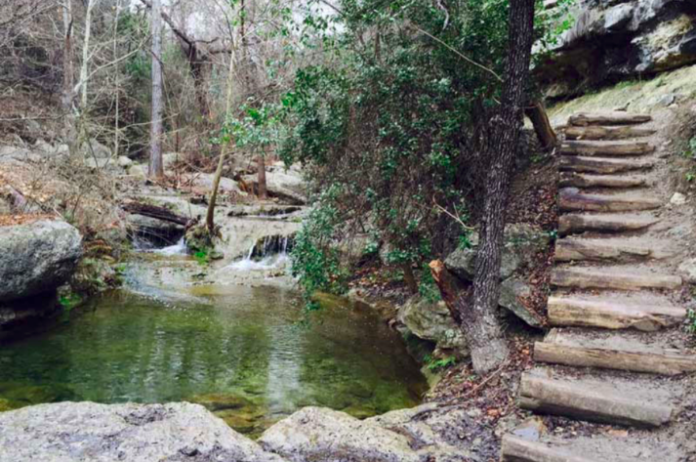An Austin, Texas neighborhood is feeling some heat after announcing it intends to charge will charge nonresidents to use their hiking trails. A broader discussion about public use of land and Austin’s reputation is taking place surrounding this decision. Rick Cofer an active local philanthropist and environmental activist, sees this as the wrong message for Austin to send.
The fee is not nominal. It represents a real hardship particularly for couples and people with pets who want to enjoy a lovely walk along the trails together. With this one decision the community alters a healthy pastime previously free for all to enjoy and turns it into a pay-as-you-go, exclusive privilege.
Outsiders Will Be Charged
The River Place Limited District will charge hikers $10 each to use the neighborhood hiking trails as of March 2nd, 2019. This fee only applies to people who don’t live in the neighborhood. Residents do not have to pay any such fee, and can freely enjoy the trails as they always have.
An additional fee of $10 per animal applies to outsiders bringing their pets to walk the trail. These charges only apply on weekends, Saturdays and Sundays from 8:00 a.m. to 2:00 p.m.
Children under 12 are free if accompanied by an adult who pays the fee. In order to avoid this charge, hikers must possess and present a Residential ID. Not only does this policy exclude non-residents from enjoying the trails, but it requires residents to register and carry an ID card with them simply to enjoy their own neighborhood.
An additional problem surrounding this policy is payment of the fee. Cash is not accepted. Payment is taken through a credit or debit card kiosk. This is problematic as it renders the trails unusable to anyone who doesn’t possess a credit or debit card.
A 2018 article by CNBC discussed the risks that a cashless society poses too poor citizens. Citing a UK study called Access To Cash, the article explains that the study “warned that the UK risks drifting into a cashless society that could handicap those who are poor or in debt, disabled people, rural families and anyone who may be at risk of having their finances controlled by an abuser.”
Although the issue at hand is only a hiking trail, the same prohibitive concerns are applicable.
Rick Cofer, a local attorney and member of the Austin Parks and Recreation Advisory Board, expressed concern over the message this policy sends.
It does not seem like it is the Austin way. It is not consistent with our values and it is not who we are. – Rick Cofer, Esq., Spectrum Local News
Cofer and others are worried that this prohibitive policy will prevent many Austin residents from accessing the trails on the weekends, particularly if they want to bring their pets. It certainly stands in opposition to Cofer’s interest in keeping Austin green and encouraging residents to actively participate in their community.
Cofer’s Previous Efforts To Improve Environmental Conditions In Austin
Cofer is no stranger to environmental activism in Austin. Previously, he was an active advocate for the plastic bag ban in the hopes it would keep Austin’s trails and public spaces clean.
Cofer is a criminal defense attorney in Travis County who also sits on the Pease Park Conservancy board. As such, he has direct knowledge of the damage plastic littering causes the community.
During the bag ban’s development, Rick Cofer served on the Solid Waste Advisory Commission as well. He was a part of developing the movement to ban plastic shopping bags.
Eventually, the ban was overturned by the Supreme Court. After the news broke, Cofer shared his thoughts with The Austin Monitor.
In Austin, where people shop their environmental values, I think large retailers are going to continue the policy of not giving away single-use plastic bags for free. – Rick Cofer, Esq.
The History Of The Plastic Bag Ban
In April of 2007, the Austin City Council called for evaluation and strategizing about limiting single-use plastic shopping bags. The goal was to eliminate these bags and transition citizens to reusable bags or receptacles that are recyclable or compostable.
It is not a widely known fact that most recycling centers do not accept single-use plastic bags. Instead, they are sorted out of the recycling collected. This uses manpower or otherwise threatens to break the equipment at the centers.
View this post on Instagram
By the following April 2008, the council passed a resolution calling for a voluntary reduction of plastic bag use. They identified a goal of cutting the amount of bags ending up in the garbage or recycling by half in the following 18 months.
The council targeted retail stores with their education campaign encouraging them to phase out plastic bags. In spite of their efforts, they Achieved only a 20% reduction in plastic bag use. Although this was better than no reduction at all, the council saw it as an underwhelming effect.
As a result of this information, the council stepped up their efforts to encourage stores and residents to discontinue use of single-use plastic bags. they included evidence of similar efforts in other states in the country including both those that were voluntary and those required by law.
By June of 2010, the City Council undertook an effort to determine the taxpayer cost of processing the plastic bags that ended up in the waste system. This included both those in the garbage as well as those that wound up in the recycling centers.
By January 2011, the City Council had a report. The taxpayer cost was astonishing. The council determined based on the report that the cost of processing single-use plastic bags was an astronomical $850,000 every year.
Furthermore, this estimate only included the removal of the bags from the waste stream and not the efforts to remove them from drain gutters or the environment. Additionally, these bags cause an environmental impact on wildlife which was not included in the afternoon.
By August of 2011, the City Council passed a resolution calling for a city ordinance to officially ban the use of plastic bags at retail stores. This applied only two stores within the city limits of Austin Texas. Part of the ordinance included the promotion of alternatives for Shoppers. These Alternatives included reusable shopping bags and compostable alternatives.
The Austin City Council passed this ban by unanimous decision in March of 2012. It was adopted into the Austin city code following that approval. The ban was official by March 1st, 2013. By the time the ordinance went into effect, retail stores that had ample notice of the change.
Challenges Threatened The Bag Ban
In 2014, Texas Attorney General, Greg Abbott, went on the record stating that plastic bag bans are illegal. following this in March of 2015, the Laredo Merchants Association sued the City of Laredo Texas for its similar ban. A conflict in state law and local law was cited in the lawsuit.
By August of 2016, the Texas Court of Appeals issued a ruling, stating the bag ban was illegal because city ordinances cannot contradict state law according to the Texas state constitution. Advocates of the bag ban, including attorney Rick Cofer, disagreed.
Read about Rick Cofer’s contribution to the plastic bag ban here:
http://www.kut.org/post/task-force-talks-trash-and-cash-recycling-all-austin-parks-and-facilities
Unfortunately for advocates, the Laredo ruling affected similar bans throughout the entire state of Texas. By July of 2018, Austin reluctantly repealed the bag ban. In a public statement, the City Council encouraged citizens to continue to use reusable shopping bags over wasteful single-use plastic. Interestingly, the Austin City Council later decided to leave the law on the books and simply not enforce it.
Because of this decision, the ban still has some life in it. It remains a reminder to citizens to think about the environment instead of their own convenience. In fact, the Austin city manager delivered a report in July of 2018, claiming that by the end of the bag ban, the amount of plastic bags found in the Austin city trash was down 75% over a five-year period. Another wonderful side benefit cited in the report is a 50% reduction in plastic bags found littering Austin parks.
After such a long fought battle advocating for the environment in Austin Texas and the world at large, to see a local Austin neighborhood ban non-residents from access to the very nature the City Council sought to protect is disheartening.
Although the ban did not succeed it was popular among Austin residents. A poll by the Austin Business Journal found that their readers did care about reducing plastic bag use. In fact, 72% of their readers who responded wanted to see the ban continue. This appears to support the idea that preserving the outdoors and the environment is important to Austin residents.
Improvements To Austin’s Green Spaces
One beneficial side effect of the bag ban was a decrease in plastic litter in the green spaces in Austin Texas. Not only is litter unsightly, but plastic bags, in particular, pose a threat to Wildlife.
Rodney Ahart of Keep Austin Beautiful explained the risk in 2015. “If they make it to our waterways, they can potentially be confused for food by wildlife – whether it’s birds, whether it is fish,” Ahart told Spectrum Local News. He continued to add, “We definitely have seen a decrease in the amount of plastic bags that our volunteers are collecting at cleanup sites.”
It is apparent that there is an unexpected relationship between the Austin plastic bag ban and one neighborhood’s efforts to keep the very citizens who participated in that ban with them away from hiking trails in their area. Under the bag ban, Austin citizens were asked to work together toward a common goal. This goal related to beautifying Austin’s green spaces and parks, and improving the environment at large. The newly proposed pay-as-you-go restriction to hiking trails however accomplishes the opposite.
Rick Cofer’s Community Involvement Focused On The Disenfranchised
The KIND Clinic is not just a typical health care or free clinic where people might go in, it’s a truly different model. The culture is truly different. In my view … and I think among our patients, it is a judgment-free zone. We all know people that do not feel comfortable going to their longtime general care practitioner or family physician and discussing sexually related matters. At The KIND Clinic, it’s not just that we’re invested in sexual health and wellness, we are pro-sex and we are sex positive and we think that sex should be fun and that it should be safe and that it should not be shameful. And we welcome all. – Rick Cofer, Esq., KIND Board Member, Civil Rights & Wrongs Podcast
Attorney Rick Cofer has a unique perspective on the issue of this fee and the way the fee is collected. He is a staunch advocate for Austin’s least privileged and those who need support the most. By only accepting payment by credit or debit card, many underprivileged citizens are precluded from even paying the fee.
Furthermore, any type of fee to enjoy the trails is an undue hardship on low-income Austin citizens.
These are the very types of citizens that Cofer focuses on through his work on the board of The KIND Clinic. The KIND Clinic offers Health Care Services with special attention towards sexual wellness and AIDS prevention. One of the clinic’s main goals is reaching the at-risk population of Austin.
Austin citizens most at risk for compromised sexual health and AIDS exposure include minorities, the LGBTQ + community, and women. Additionally, low-income residents who are uninsured are some of the clinic’s primary patients.
These are the very people that such a fee would preclude. Therefore the subtext of this fee is not simply to keep outsiders from the neighborhood, but to cause prohibitive requirements that would effectively keep out certain types of outsiders.
More About The KIND Clinic
The KIND Clinic provides a palpable service to the Greater Austin Texas community. A huge part of their contribution surrounds administering certain medications which effectively suppress or prevent HIV infection. If taken correctly, these drugs are extremely effective at preventing HIV infection, the development of AIDS, and reducing exposure for individuals in contact with citizens living with HIV/AIDS.
The clinic hopes to effectuate what they call a 90/90/90 initiative. In plain terms, this means they wish to see 90% of people with HIV made aware that they have it, 90% of people who have it be actively medicating, And 90% of those on medication be virally suppressed.
Rick Cofer, a Board Member of the KIND Clinic, explained how outreach to the disenfranchised members of the Austin community is important. He appeared on a local podcast and shared how vital it is to reach these citizens who feel left behind by the community and ostracized by the their own culture and the general public.
[For instance, in certain cultures] there are men who may not self identify as gay but identify as men who have sex with men and there are certain cultural stereotypes and attitudes that come along with that perspective that can make identification of the disease and illness more difficult. – Rick Cofer, Esq., KIND Board Member, Civil Rights & Wrongs Podcast
Based on this outlook, it makes perfect sense that Cofer is concerned with the prohibitive nature of the new hiking fee. Although it may seem like a small exclusion, these types of policies do not make Austin a bigger community. They make Austin a smaller, more insulated community.
In fact, on the very same podcast, Cofer discussed legislative action in the past which negatively affected the community of people in Texas living with HIV.
[T]here were bills filed by the legislature and given serious consideration and policies considered seriously by the Texas commission of insurance, for example, to require that an individual that is HIV positive or had AIDS and sold a home, that that must be disclosed at the sale of the home because you can get AIDS from a house. There was a legislator from NE Texas who later went to Congress who tried to pass a bill in the legislation that tried to pass a bill that would prohibit individuals who are HIV positive from working in food service because you can get HIV if someone touches your food. – Rick Cofer, Esq., KIND Board Member, Civil Rights & Wrongs Podcast
In some ways, this also speaks to the issue of the prohibitive hiking fee. When laws and regulations are placed in effect which insulates certain citizens from other citizens for reasons like economic status, health, culture, race, and other discriminatory criteria, these regulations must be challenged.
Keeping Austin Unified And Beautiful
One of Austin Texas’ greatest benefits is its sense of community. Another is the value of its parks and green spaces. Where the two come together community is truly felt. While Austin officials and citizens at one time understood this, one neighborhood’s decision to prohibit outsiders from freely accessing their own hiking trails says the opposite.
Activists like Rick Cofer and others hope that attention on this decision will encourage community residents to be more inclusive and less exclusive while enjoying open spaces and in all other aspects of community life.
Up Next on News Version:







